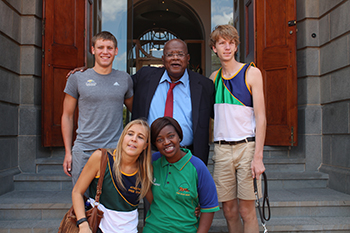Latest News Archive
Please select Category, Year, and then Month to display items
12 October 2020
|
Story Arina Engelbrecht
|
Photo Supplied
 Arina Engelbrecht from Organisational Development and Employee Well-being believes physical activity has a number of benefits for one’s health, including stress relief.
Arina Engelbrecht from Organisational Development and Employee Well-being believes physical activity has a number of benefits for one’s health, including stress relief.
Being physically active plays a big role in preventing the development of mental-health problems and in improving the quality of life of people experiencing mental-health problems.
Treatment for depression
Physical activity can be an alternative treatment for depression. It can be used as a stand-alone treatment or in combination with medication and/or psychological therapy. It promotes all kinds of changes in the brain, including neural growth, reduced inflammation, and new activity patterns are formed that promote feelings of calm and well-being. It releases endorphins – powerful chemicals in the brain that energise your spirit and make you feel good.
Physical activity can be very effective in relieving stress. Research in adults has found that physically active individuals tend to have lower stress levels compared to individuals who are less active. It also leads to improved sleep. When a person sleeps better and feels more rested, overall quality of life improves. They cope better with daily life stressors.
Reduce Alzheimer's risk
Regular physical activity can reduce your risk of developing Alzheimer's disease by up to 50%. It can also slow down further deterioration in those who have already started to develop cognitive problems. It stimulates the brain’s ability to maintain old connections as well as to make new ones.
A study asked people to rate their mood immediately after periods of physical activity (e.g. going for a walk/run, cycling, doing housework) and periods of inactivity (e.g. reading a book or watching television). Researchers found that participants felt more content, more awake, and calmer after being physically active compared to after periods of inactivity.
In conclusion, people who are physically active feel a sense of well-being, feel more energetic throughout the day, sleep better at night, have sharper memories, and feel more relaxed and positive about themselves and their lives.
“Being physically active not only changes your body, it changes your mind,
attitude, and your mood.” – Arina Engelbrecht
Five Kovsies competing at National Championship for Physically Disabled
2016-03-18

Students from the University of the Free State (UFS) will compete at the Nedbank National Championship for the Physically Disabled in Bloemfontein from 21–23 March 2016. From back left is Johann van Heerden, Prof Jonathan Jansen, Vice-Chancellor and Rector of the UFS, and Danie Breitenbach. Front from left is Louzanne Coetzee and Dineo Mokhosoa.
Photo: Jóhann Thormählen |
Five students from the University of the Free State (UFS) will be taking part in the Nedbank National Championship for the Physically Disabled from 21–23 March 2016 in Bloemfontein. Dineo Mokhosoa, Juanré Jenkinson, Louzanne Coetzee, Danie Breitenbach and Johann van Heerden will represent the Free State at this event – one of the last opportunities to qualify for the Paralympic Games.
According to Martie Miranda, Head of the Center for Universal Access and Disability Support (CUADS) at the UFS, these students have shown they can achieve anything. “The Center for Universal Access and Disability Support is extremely proud of our students with disabilities who excel in sport and wish our students the best of luck with the national championships,” she said.“They confirm that ‘impossible’ is just a word.”
Most of the students already have excellent national and international rankings in their respective categories.
Mokhosoa (Cerebral Palsy), is ranked first in South Africa in discus, shot-put and long jump. This Social Work student also has two South African records in shot-put and long jump respectively behind her name. Jenkinson (Cerebral Palsy) is ranked eighth in the world in shot-put.
Coetzee (blind), who competes in the 800 m, 1 500 m and 5 000 m, is fifth in the world in the 800 m and ninth in the 1500 m. Breitenbach (blind) runs 400 m, 800 m and 1 500 m. Breitenbach, a Law student, is ranked fifth in the world in the 800 m.
Van Heerden (Cerebral Palsy) competes in swimming in the 50 m, 100 m and 200 m breaststroke. The Education student is ranked third in the 50 m, seventh in the 100 m and third in the 200 m in the world.
The Paralympic Games is taking place in September 2016 in Rio de Janeiro, Brazil.